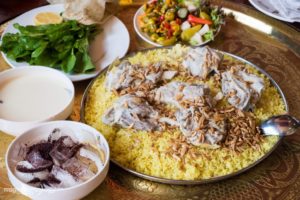Views toward the USA are obviously a very difficult thing to write about, and a very hot topic in the Middle East – for obvious reasons. After speaking with ARabs for many years I do not sense a very substantial degree of difference between men and women and their views toward the USA but there certainly are differences between generations. Here is an example. Under Saddam Hussein’s government Jordanians received free gas. After the USA invaded and toppled the government Jordanians stopped receiving free gas, and in fact the American war in Iraq set off a domino effect of negative economic consequences for Jordan as a whole. Obviously, the young generation (below 30) today doesn’t really feel the effects of this as much as the older generation. The older generation also has a longer memory of US actions in the region. The Younger generation tends to be more favorable toward the USA because of the cultural influence – music, movies, etc. However, nearly every ARab I have spoken with for the past ten years makes the distinction between the US government and the US people/culture/land itself. There is a great dissastisfcation and even anger toward the US government for obvious reasons but also a great draw toward US culture and values. This is the classic case of “soft power.”
Trump’s presidency throws all of this into the air. What most Arabs say about Trump’s presidency is that certain actions of his are not just bad for the USA but bad for the entire world, and certainly the region here. Many Arabs are also deeply suspicious of Trump’s close relationship with Saudi Arabia. They cannot believe that Trump sold Saudi Arabia, for example, so many weapons recently without any qualifications and these weapons are being used to slaughter so many innocent people in Yemen. This being said, one interesting thing as well is a deep dissatisfaction with Obama’s presidency. Many Arabs view Obama as correct in a philosophical/theoretical sense – meaning, the USA shouldn’t be mired in wars in the Middle East – but are frustrated with him in a practical sense. There is a great degree of dissastisfaction with Obama for not having done more, for example, to stop the escalation of the war in Syria long ago.





 Greetings from Amman, Jordan. This weekend was Eid al-Fitr which is the Muslim holiday to end the month of Ramadan. In the days before Eid, the streets swell with parents out shopping for clothes and gifts to give their children to celebrate the end of Ramadan. I spent the weekend camping in the canyons of “Dana Biosphere Reserve” (see pictures) and doing some great hiking. We camped with local bedouins and had a wonderful celebration. The bedouins give new meaning to the word hospitality – serving us mint tea and “zarb,” a famous dish of lamb or goat cooked with rice, carrots, onions, and potatoes in a specially-constructed hole in the ground that is filled with olive wood for cooking.
Greetings from Amman, Jordan. This weekend was Eid al-Fitr which is the Muslim holiday to end the month of Ramadan. In the days before Eid, the streets swell with parents out shopping for clothes and gifts to give their children to celebrate the end of Ramadan. I spent the weekend camping in the canyons of “Dana Biosphere Reserve” (see pictures) and doing some great hiking. We camped with local bedouins and had a wonderful celebration. The bedouins give new meaning to the word hospitality – serving us mint tea and “zarb,” a famous dish of lamb or goat cooked with rice, carrots, onions, and potatoes in a specially-constructed hole in the ground that is filled with olive wood for cooking.